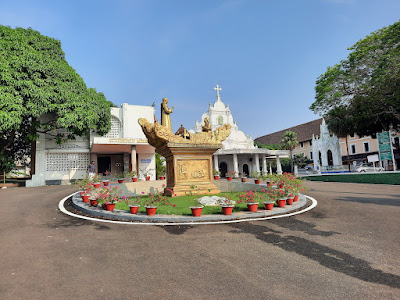Religion with Education
I accompanied a group of my students to a pilgrimage
centre today as part of my school’s usual ritual before the annual exams.
Perhaps that’s a very pertinent destination for such a trip which is meant to
seek the blessings of a divine personality on students before their exams. The
patron saint of the place is a monk who revolutionised a whole system in
Kerala. He is Chavara Kuriakose Elias, one of the officially recognised saints of
the Catholic church.
Born in 1805, Kuriakose Elias
witnessed a lot of injustice. The poor were deprived of every possible delight of
life in those days. Those were days when the caste system of Hinduism ruled the
roost. The low caste people and the untouchables had no rights whatever. They
were not even allowed to eat sufficient food. Keeping people hungry is one of
the easiest ways of subjugating them. Their young girls would be carried away
by the upper caste men for their transient delights. There were even traditions
like a newly married bride of a peasant had to be deflowered by the landlord
before she could sleep with her husband. Kuriakose Elias lived in a time when
the low caste women had to walk in public places with their breasts uncovered
so that the higher caste people could ogle. And do a lot more, of course, since
there was no untouchability at night. And it was also the time when education
was denied to everybody except the higher castes.
It was then Kuriakose Elias opened the first Sanskrit school in
India that invited everyone irrespective of caste and creed to learn and grow
out of the oppressive socio-political system. Remember how Manusmriti, the holy
book of Hindutva, had stipulated that any low caste person who happens to hear
the Vedic shlokas recited must have molten lead poured in his ears? It was when
that rule and many other such heartless rules were in practice that Kuriakose
Elias put up a small roof over a patch of land and invited the untouchable
people of the place to send their children to come and learn Sanskrit. In the
year 1831. The teacher was one Mr Warrier, a high caste Hindu.
It will be highly interesting to
study why a high caste Hindu would do something that was to undermine his own
religious system. Warriers were quite an exploited lot in those days. Too many
people were exploited in those days, in fact. Anyone who did not belong to the
privileged group was a victim. Is the situation any different today? Look at
our economic inequality now. A tiny group of people own most of the country’s
wealth and the whole political system is giving them still more. And more.
We are still practising the ancient
caste system. In a new way. With a new rhetoric. With a new Manu on top.
We need another Kuriakose Elias, I
thought as I was returning from Mannanam (near Kottayam in Kerala), the place
where his tomb is today. We need a revolutionary visionary who can shatter the
myths which are being imposed on us today as historical truths. We need a
visionary who can dispel the darkness of rhetoric and histrionics with the
radiant light of wisdom.
Kuriakose Elias dared to bring
Sanskrit to the low castes and the untouchables in a time when that was thought
to be impossible. He was the first individual to open a printing press in India
at that time. He started a newspaper, Deepika. He was aware of the power
of the press better than any politician. He changed Kerala’s outlooks and
attitudes and made it a far better place than any in India.
We need someone like him today, I
thought as I returned home from Mannanam. He was a religious person but his religon had a heart. And, more importantly, a brain.
 |
| A replica of the house where Kuriakose Elias was born (in the museum) |
 |
| A view of the pilgrimage centre |
 |
| Inside the church |
 |
| My students |

We need such noble people in every religion. Glad to know about the great soul. By the way, I am writing this comment as rolling my train into Trivandrum.
ReplyDeleteAre you attending some function in TVM?
DeleteYes.
DeleteHari Om
ReplyDeleteQuite so... YAM xx
This is a highly educative post. You are correct. Divide and Rule has always been the foundational stone of political and social supremacy.
ReplyDeleteToday's post of mine is about this identity politics which divides and rules easily.
DeleteThe sooner the better.
ReplyDelete